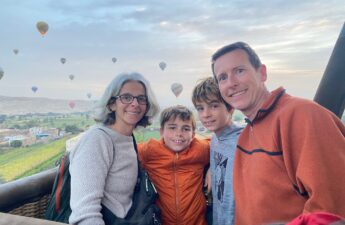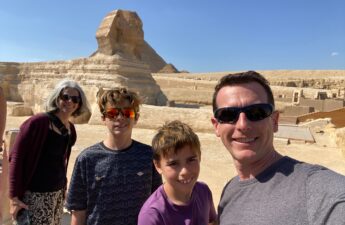Siwa Oasis is nestled in the vast and barren Sahara Desert in Egypt. Located approximately 50 kilometers east of the Libyan border, Siwa Oasis is a haven of lush palm groves, crystal-clear freshwater springs, and picturesque salt lakes.

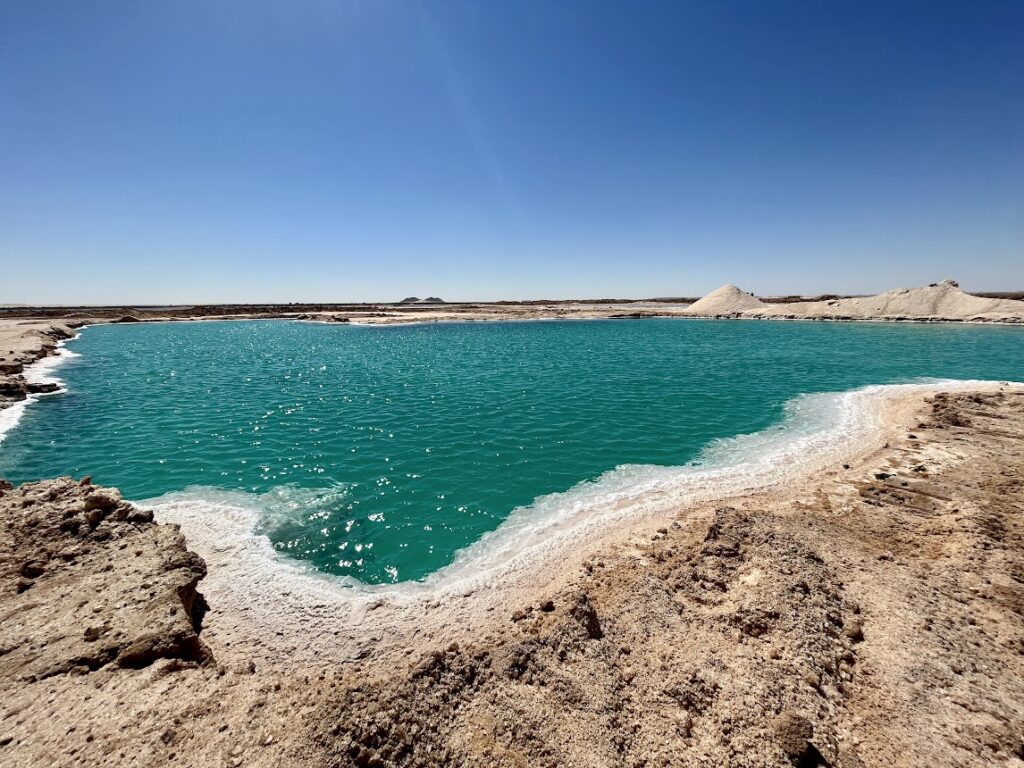
Siwa Oasis has a long and illustrious history that dates back thousands of years. It was once home to the ancient Berber civilization and served as an important trade hub along the Silk Road. The remnants of this rich past can still be witnessed in the form of archaeological sites, such as the Temple of the Oracle, the ruins of the Shali Fortress, and the awe-inspiring Mountain of the Dead. These ancient treasures provide a glimpse into the lives of the people who once inhabited this oasis.

The local culture of Siwa is deeply rooted in its historical heritage. The indigenous population, known as the Siwan people, has preserved their unique language, customs, and traditional practices for generations. Their distinctive architecture, with mud-brick houses and intricate decorative motifs, adds to the oasis’s charm and authenticity.

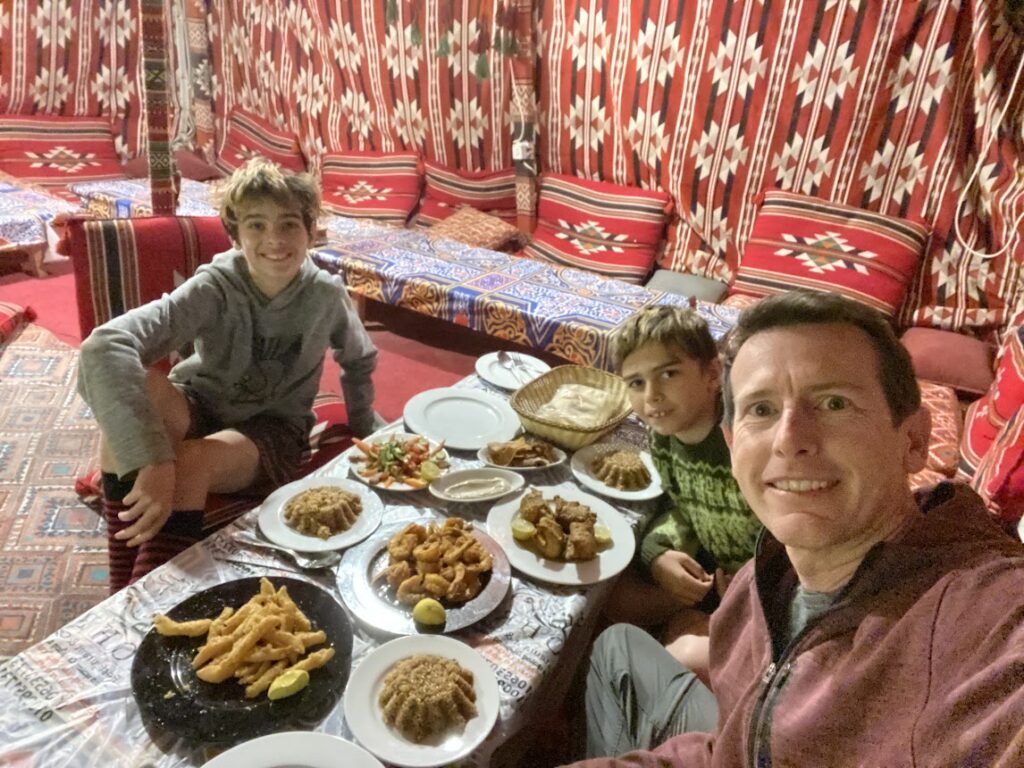
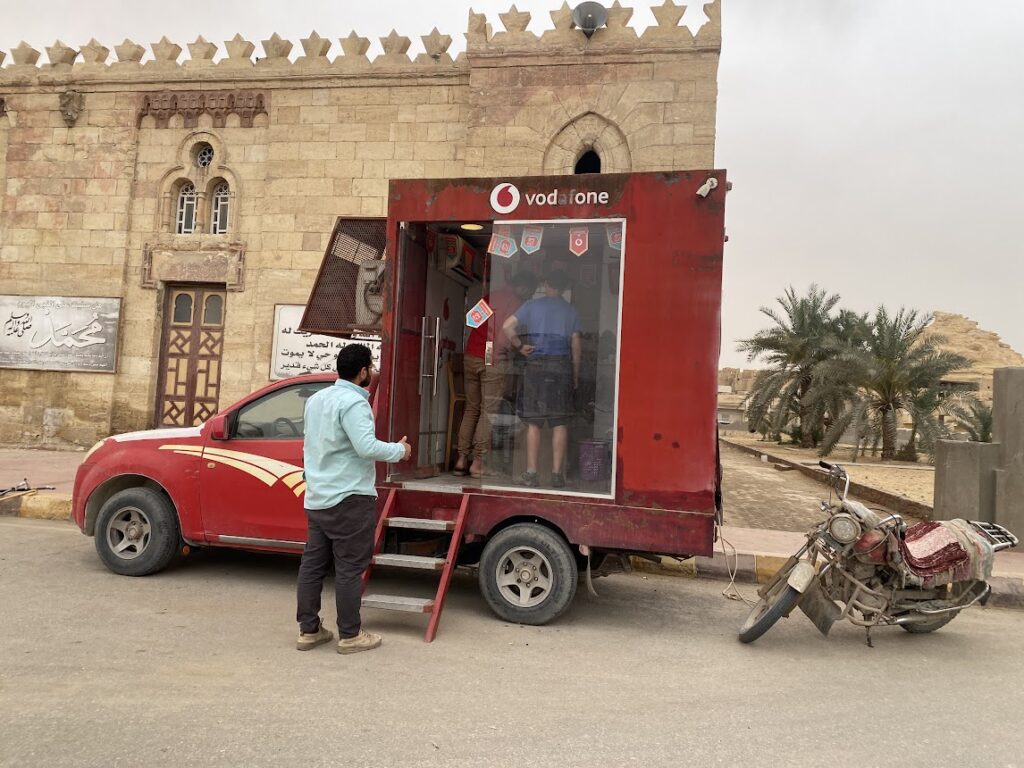

We booked a trip to Siwa because we met a family on Facebook who lives there. Camilla and her partner Daniel and their three children (12, 8, and 2) have created a wonderful farm as well as the rental property we stayed in, in the Shali. They invite worldschooling families to visit throughout the year so their children can meet other kids.
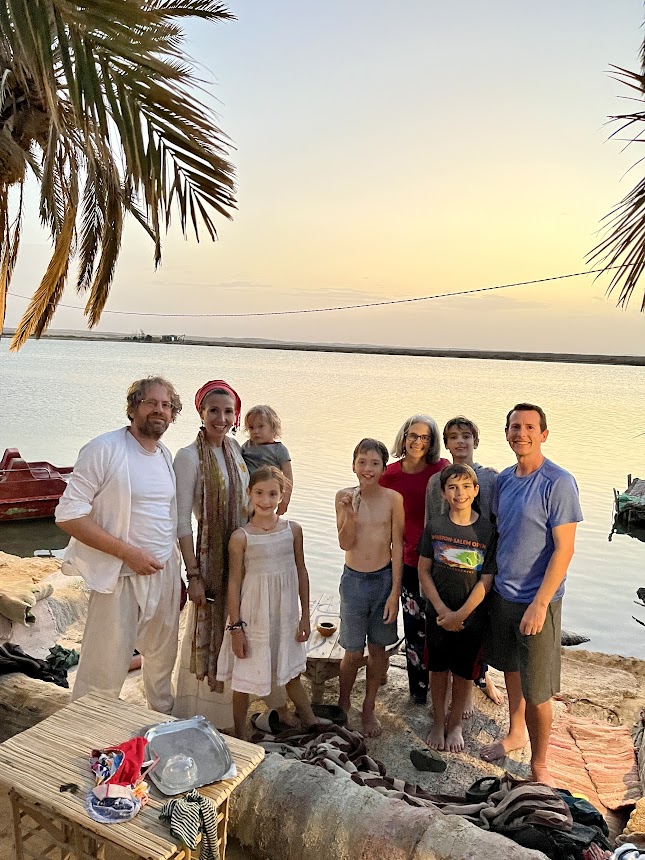
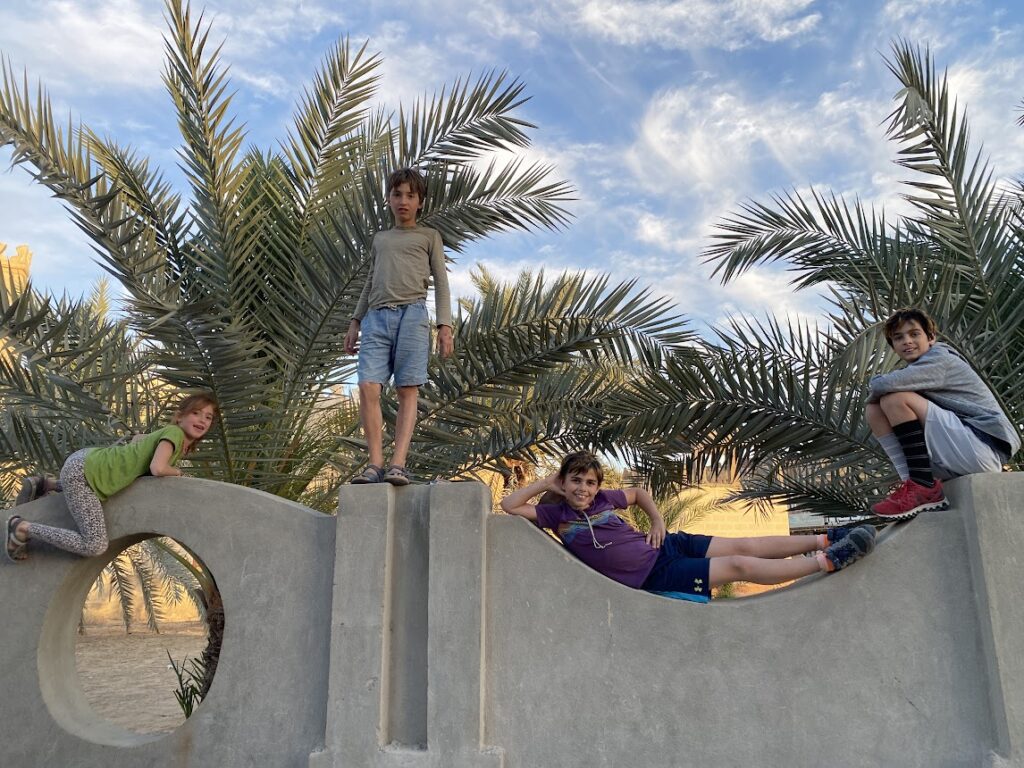
We arrived in Siwa at 11:30 am. We traveled overnight in a microbus from the airport. There is a lot of construction between Cairo and Siwa, so the road is bumpy. There are also several security
checkpoints, but they are easy to move through.
Daniel met us at our home for the next two weeks. It is a three-bedroom, two-bath mud house next to the Shali fortress. It is one of the more unique houses we have stayed in on our travels. It instantly felt like home.

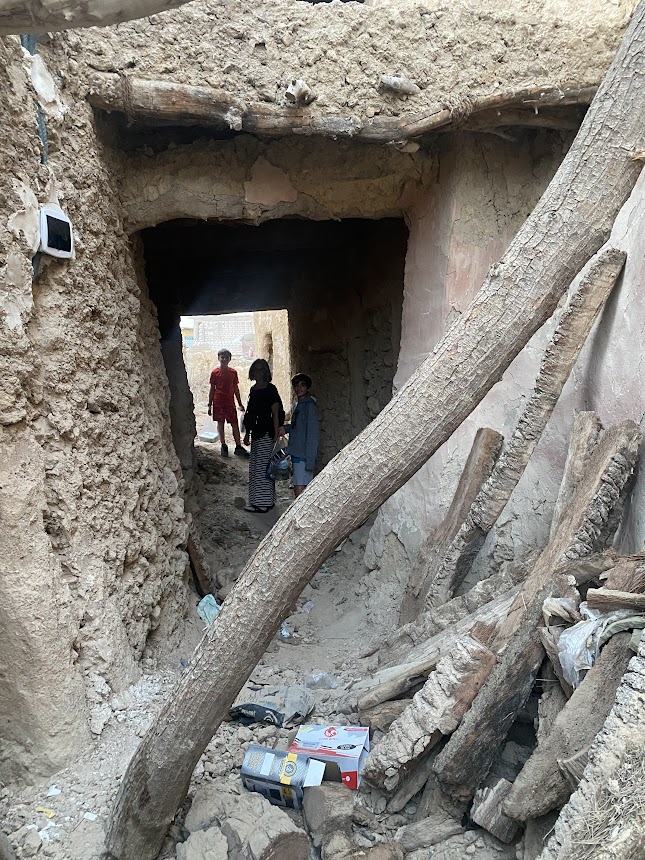
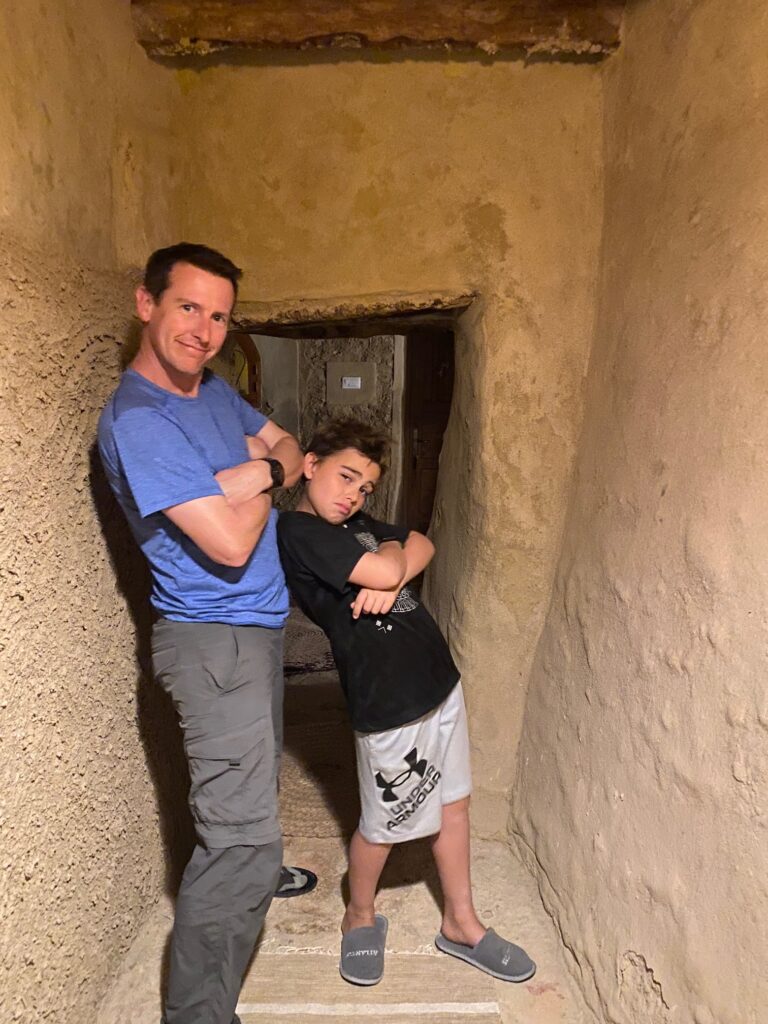
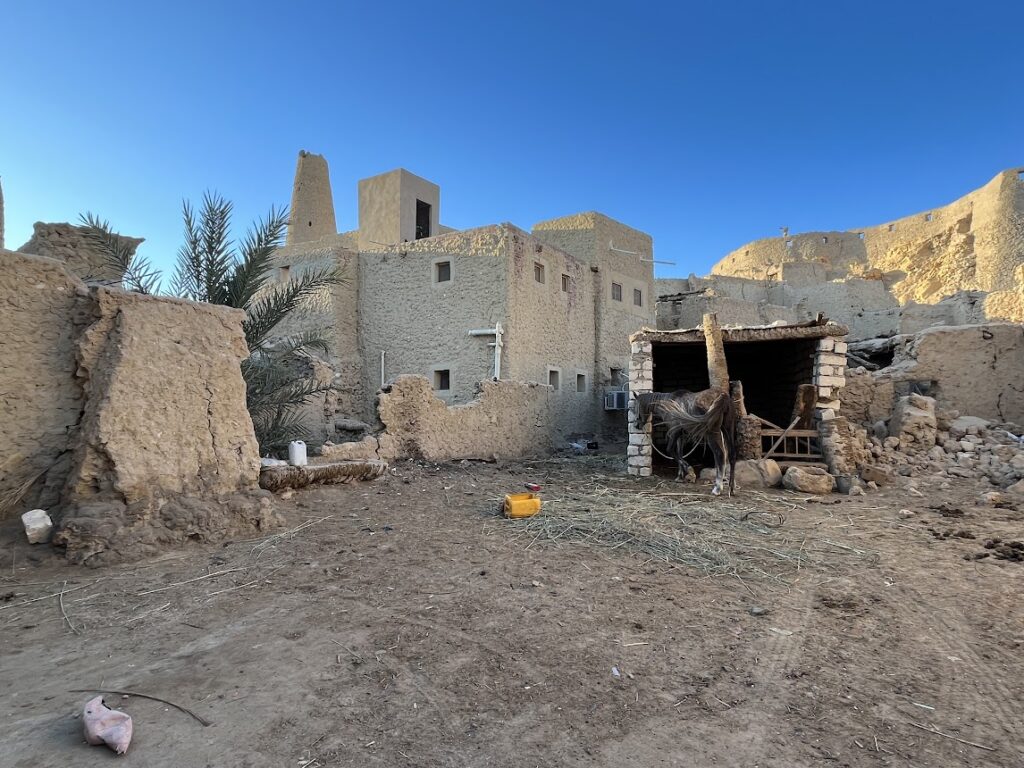
Michael, Lucas and I woke up early one morning to watch the sun rise from the top of the Shali fortress.
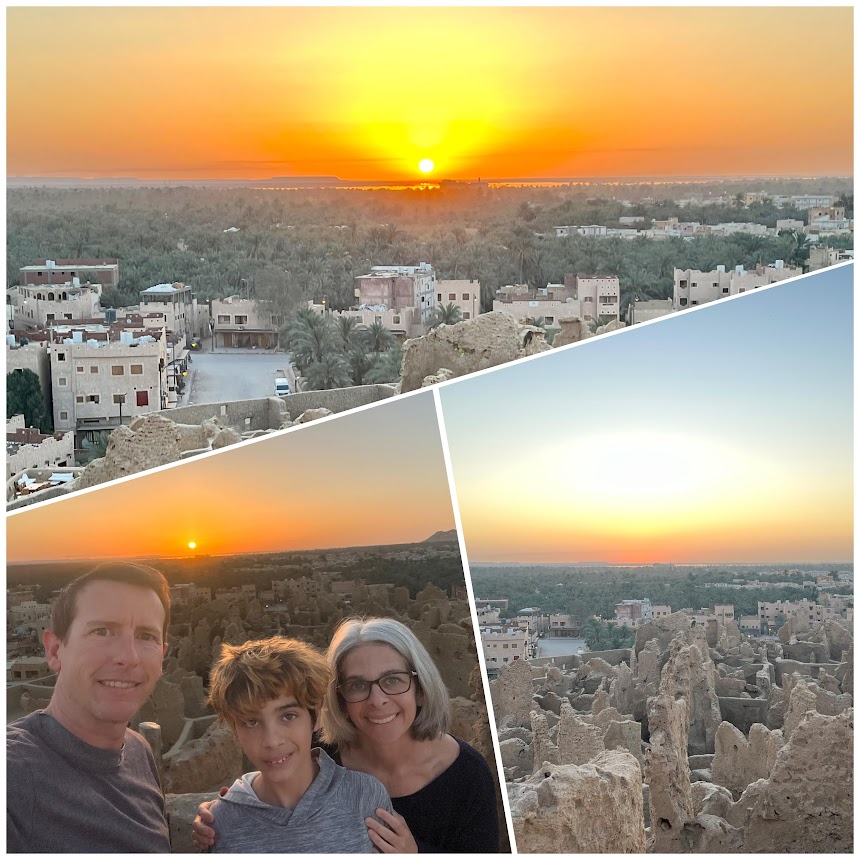
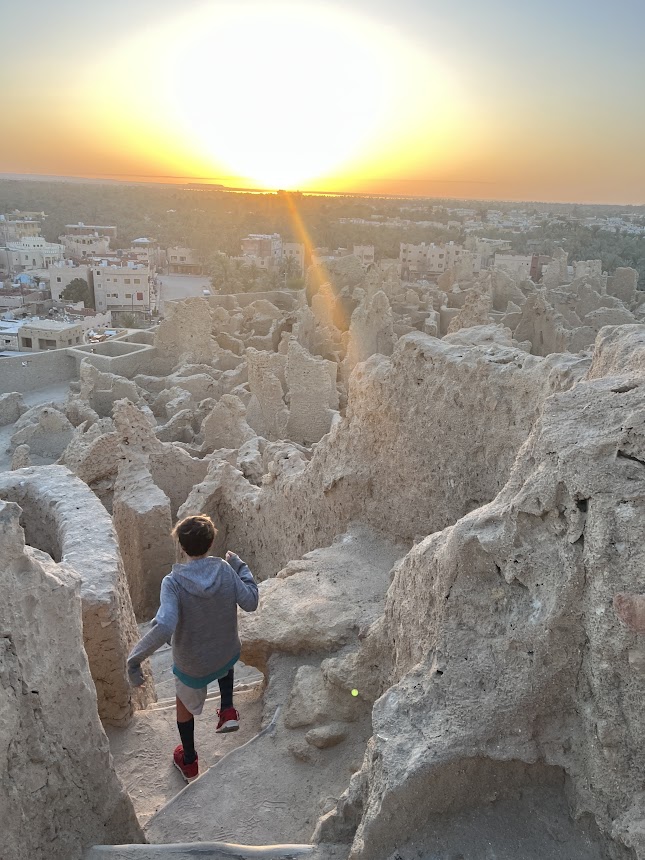
On our first night in Siwa were fortunate to be a part of an amazing celebration. We were invited to break the Ramadan fast with Camilla and Daniel’s friend Adel and his family. This was a special occasion because Adel’s nephews had just been released from prison where they were held as political prisoners for six months.

I went with Camilla to Adel’s house where the women gathered. The men were gathering down the street under tents. The men and women do not mingle at such events.
Siwa women are an integral part of the vibrant community in Siwa Oasis, Egypt. They play a significant role in preserving the cultural heritage and traditions of the oasis, while also contributing to the local economy and social fabric. When a Siwa woman marries, she takes a black veil with distinctive embroidered red and orange stripes. When she goes outside, her face is completely covered. At home, Siwa women wear beautiful dresses and jewelry.
Camilla and I ate in the house with the older women, which is a sign of respect. The Siwa culture is matriarchal. The older women are looked after by the younger women. When I entered the house, the women were all sitting on the floor around a large table. I greeted each woman by taking their hand for a moment.
The women sat patiently waiting for the men to finish their prayers. The fast was broken with dates and juice. The food is brought out in communal bowls, and everyone eats out of the bowls with a
spoon. There are no individual plates. We ate rice, salad, bread, stewed vegetables, and meat. Meat is a delicacy in Siwa because it is expensive.
Michael was with Daniel and the men talking and eating the same food. Lucas and Henry ran around with the kids playing tag and shooting off fireworks. It was an exciting first day in Siwa.
The next day, we explored the Shali Fortress with Camilla and her family. Our home in Siwa is in the Shali. The Shali Fortress is built entirely of clay and mud bricks and offers panoramic views of the surrounding landscapes.
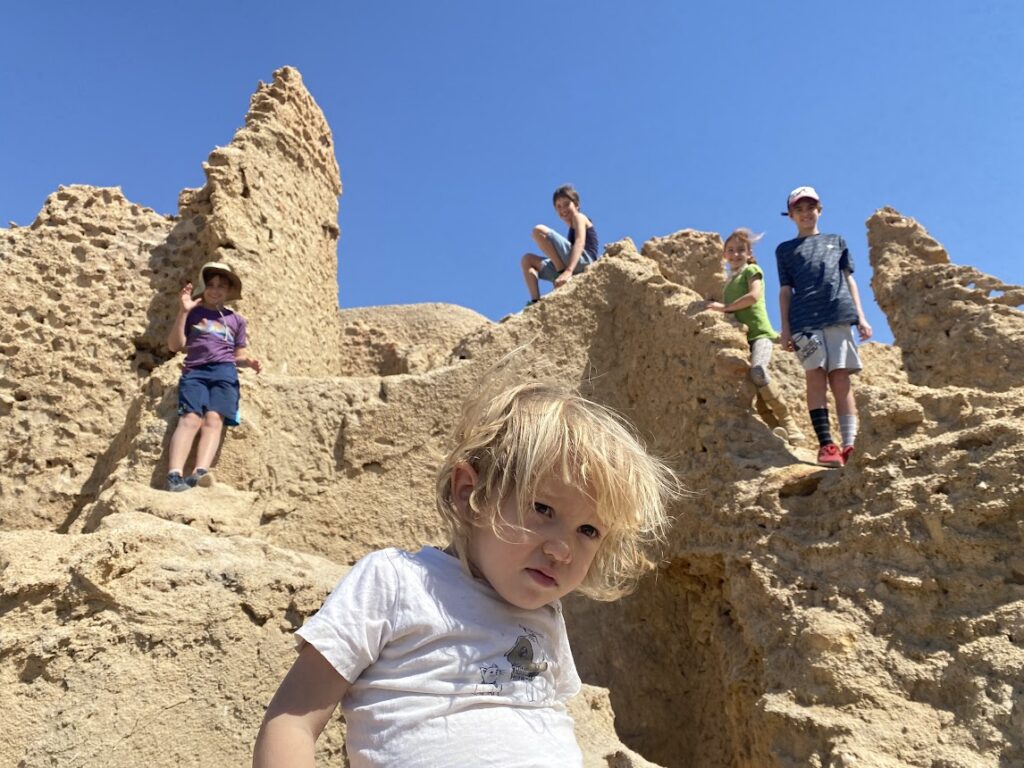
Originally constructed as a defensive stronghold, the fortress served as a protective barrier against invasions and provided a haven for the local population. Its strategic location on a hill provided a vantage point to monitor the oasis and its surroundings. However, the fortress’s most distinctive feature is its unique honeycomb-like structure, with interconnected houses, narrow streets, and alleyways. Lucas and Henry enjoyed running through the labyrinth.

The Shali Fortress suffered significant damage due to heavy rainstorms in the 20th century, causing the mud-brick walls to dissolve. Some of the fortress was restored, but much of it is in ruins.
We spent a lovely afternoon on Camilla’s farm. The kids ran around the property, played with goats and kittens, and played cards. The farm is a peaceful and beautiful place. There are trees and plants
everywhere. The buildings are built out of mud and have a lot of character. Camilla spent the last 16 years turning the land into her family’s oasis within an oasis.

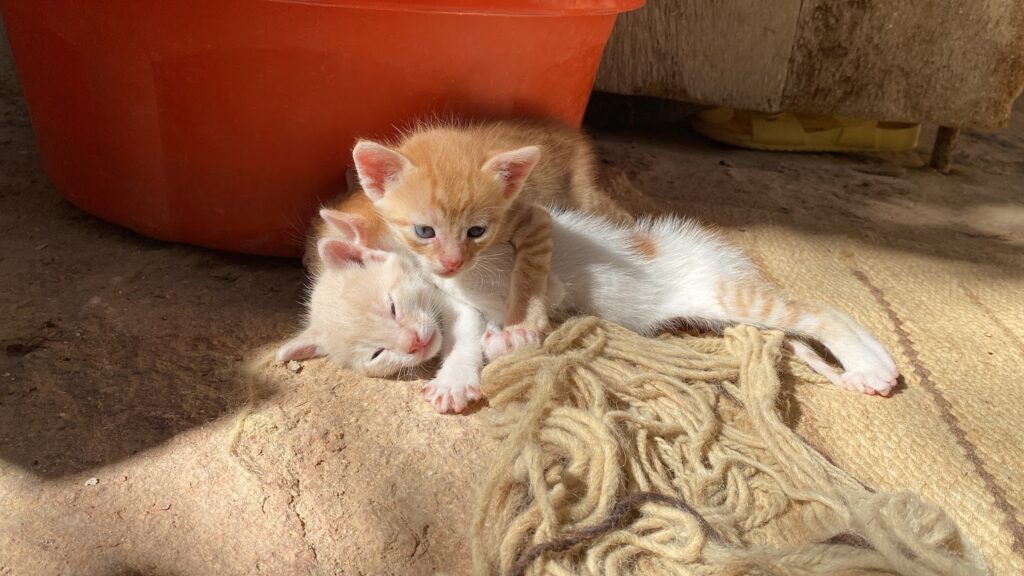
Ramadan is a challenging time to come to Siwa. Many shops are closed during the day. Everyone is busy each day preparing for the evening’s break of the fast. Many people are also tired because they fast
all day. We still enjoyed being in Siwa during this time. At night the city comes alive, and it is fun to experience.
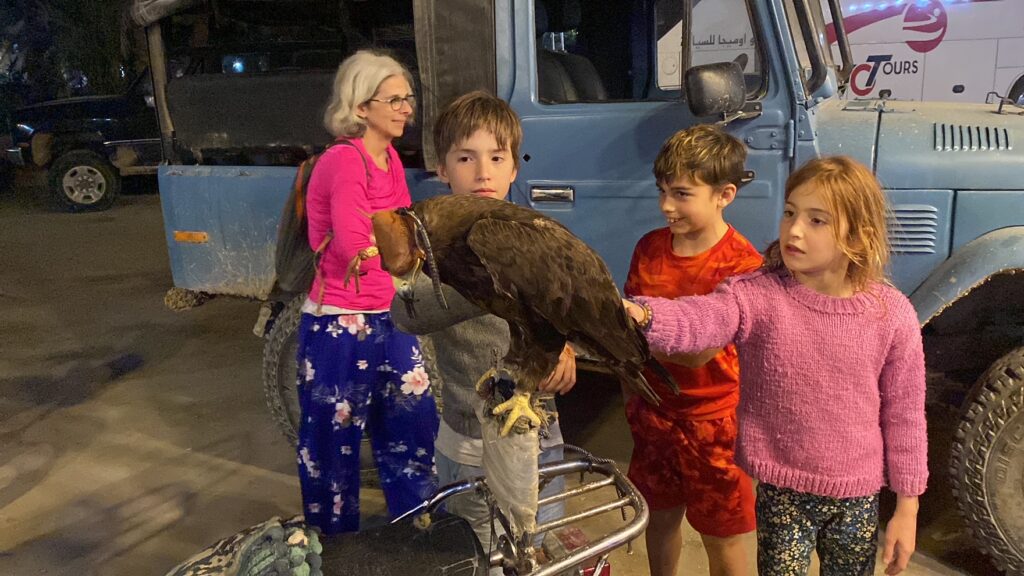
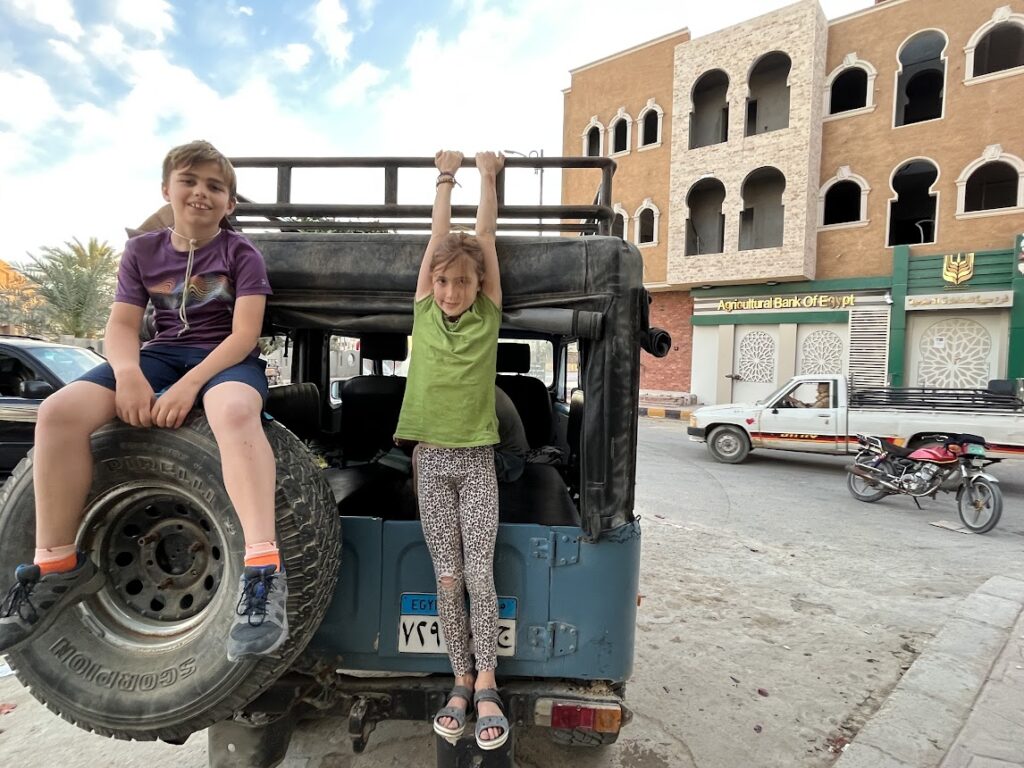
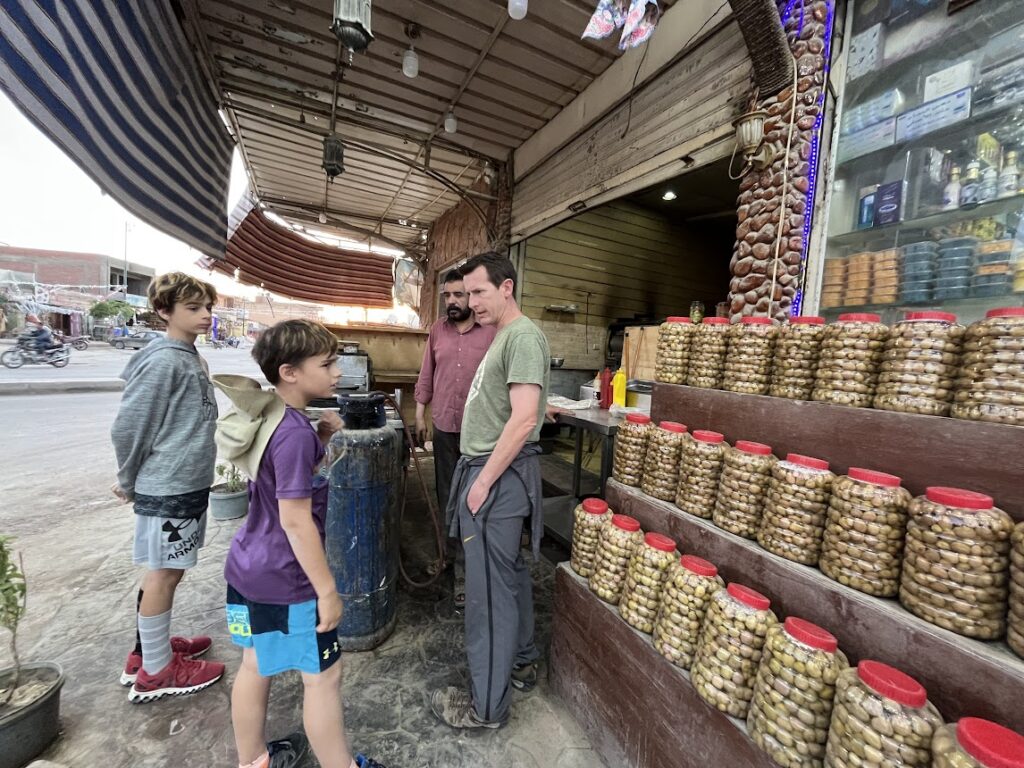
On day four, Lucas and Henry went on an adventure with Luca and Astra. They went with their facilitator Roudaina to the home of another family near the desert. The family just moved to Siwa from Dubai. They are living in tents while they build their home. The kids went grocery shopping and then cooked an Egyptian dinner. They also played games. They did not get home until 11 pm because their car got stuck in the sand.

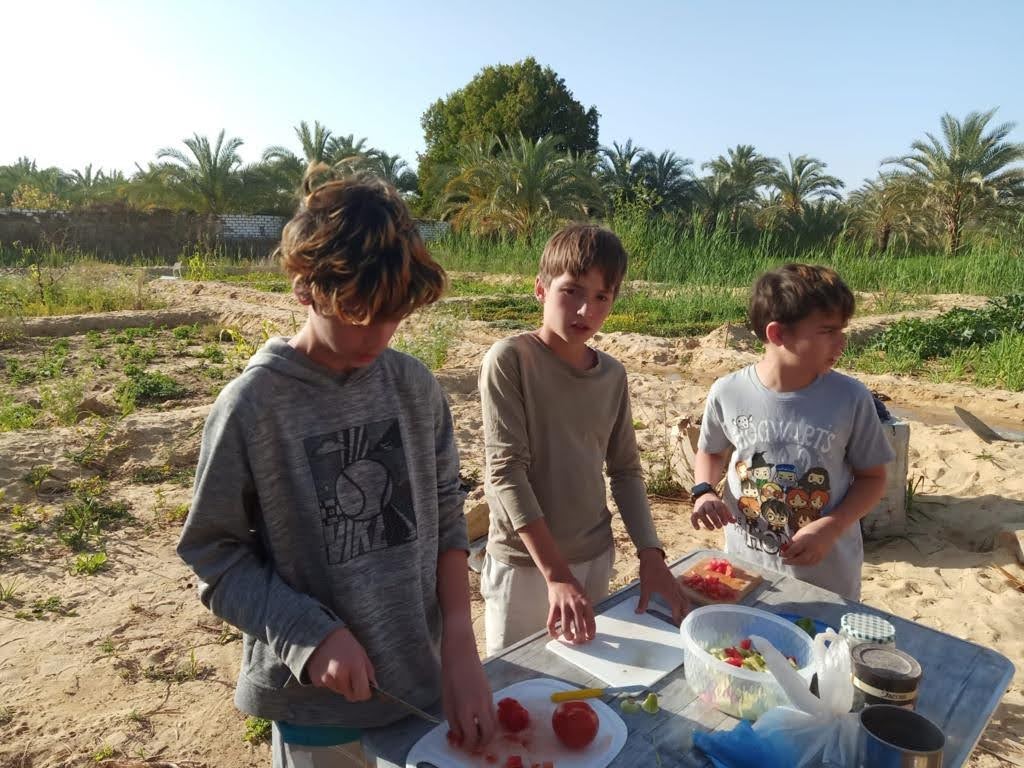


Camilla, Daniel, Astra, and Indigo picked us up on day five for a day of water adventure. Our first stop was to the salt lakes. Siwa exports salt. The digging creates salt pools that people swim in. These pools have more salt than the Dead Sea. The feeling of floating in these pools is unlike anything we have experienced.
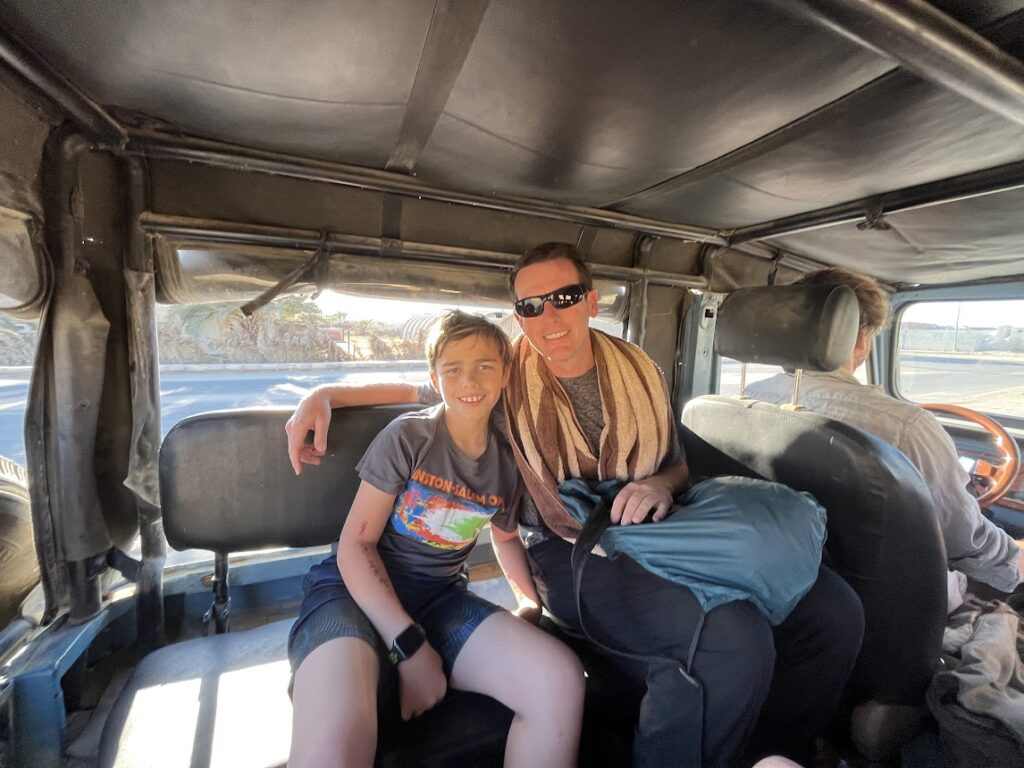
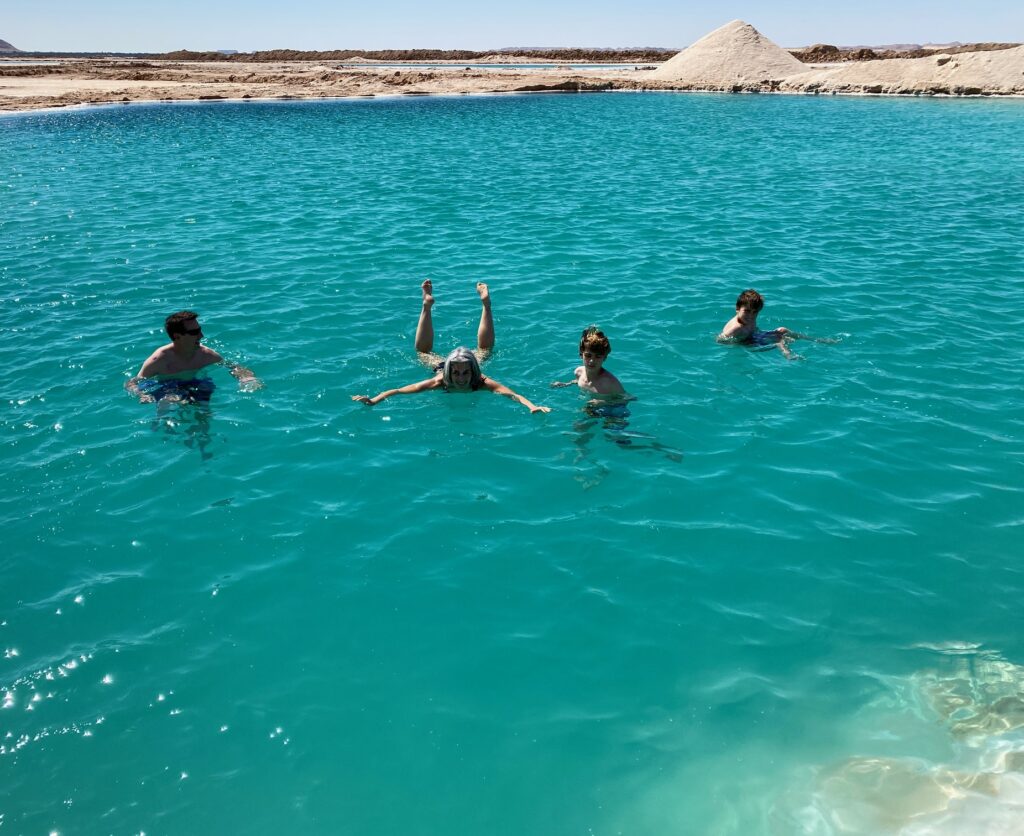

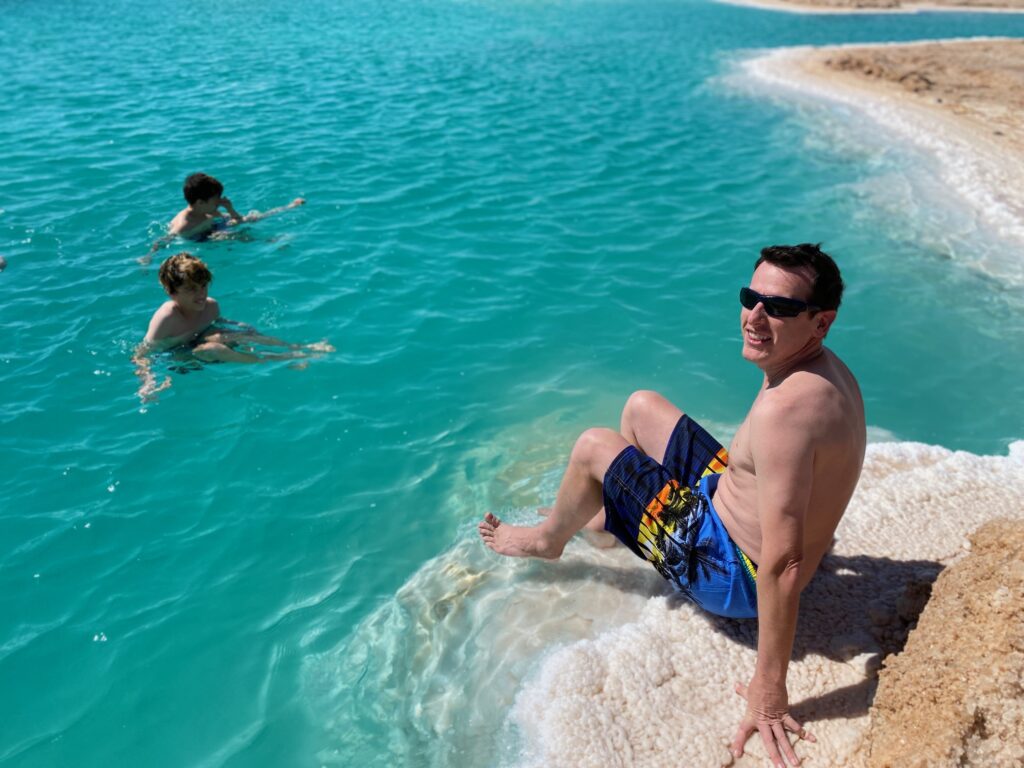
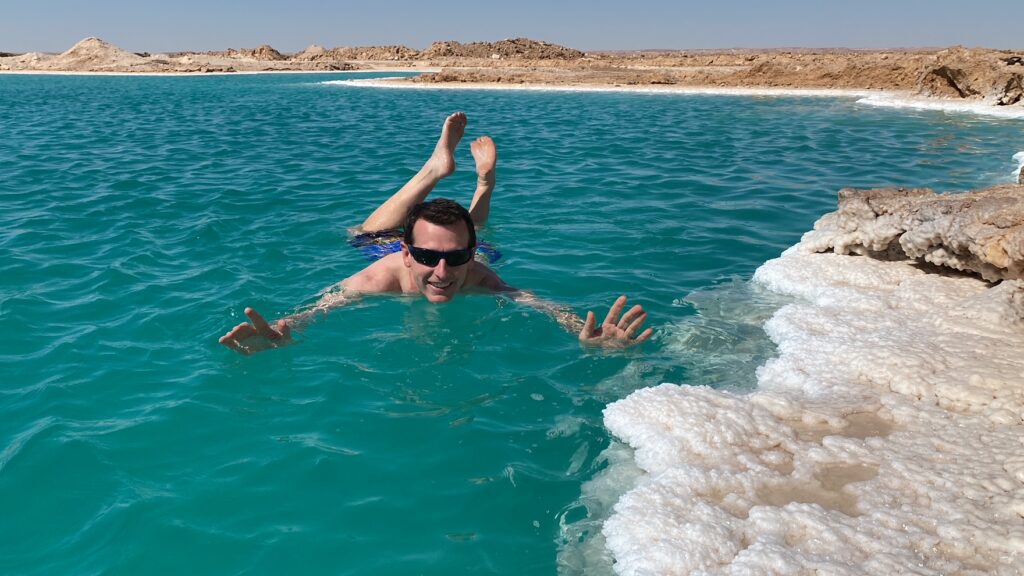

We rinsed off in an old Roman spring before ending our day at the hot springs. We brought Siwa mud with us to wash our hair and face. It is nice for the skin.
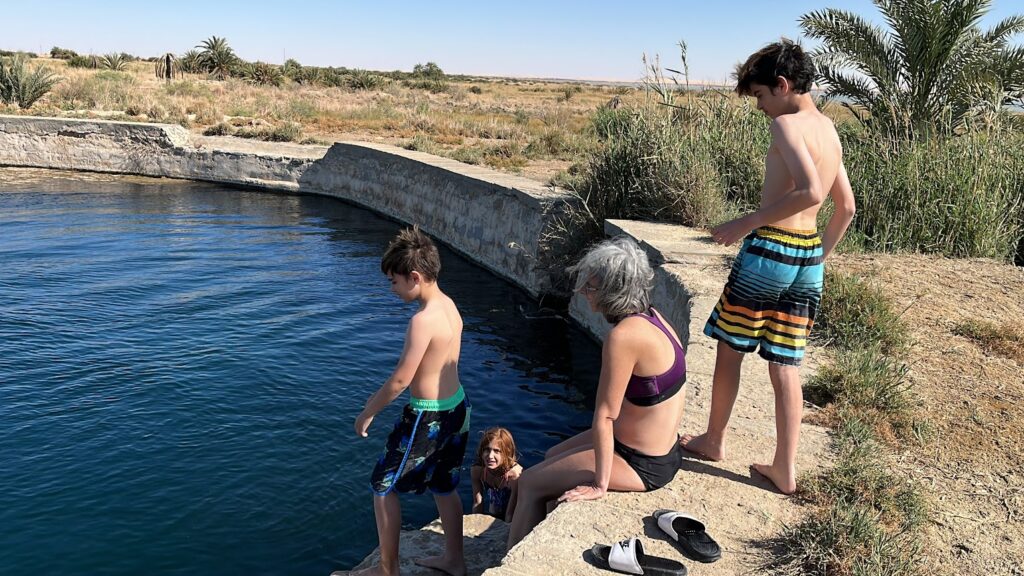
On day six, Camilla’s friend Adel picked us up and took us to the Oracle temple. We also saw the Spring of Juba (also known as Cleopatra’s Spring). Thirty years ago most of Siwa had no running water in their homes. They would shower in springs. Many people still do that in Siwa. We saw about 20 kids gathering at a spring to bathe before Friday prayers. Kids as young as 10 drive horse and motor-powered carts and motorcycles around the town.
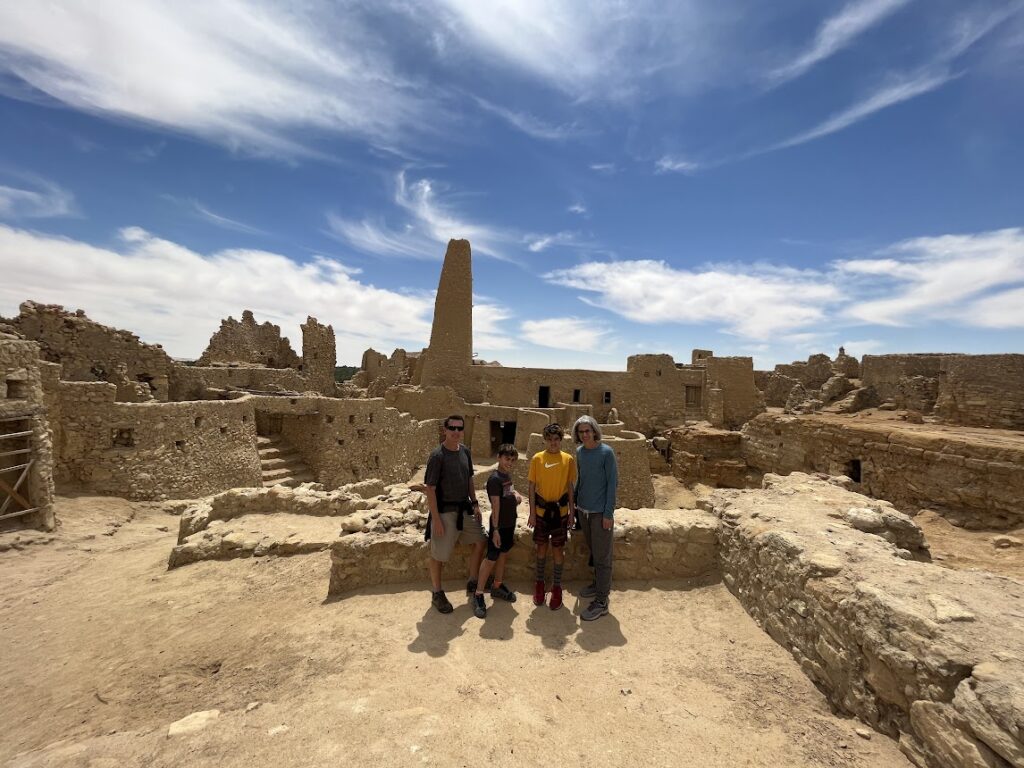
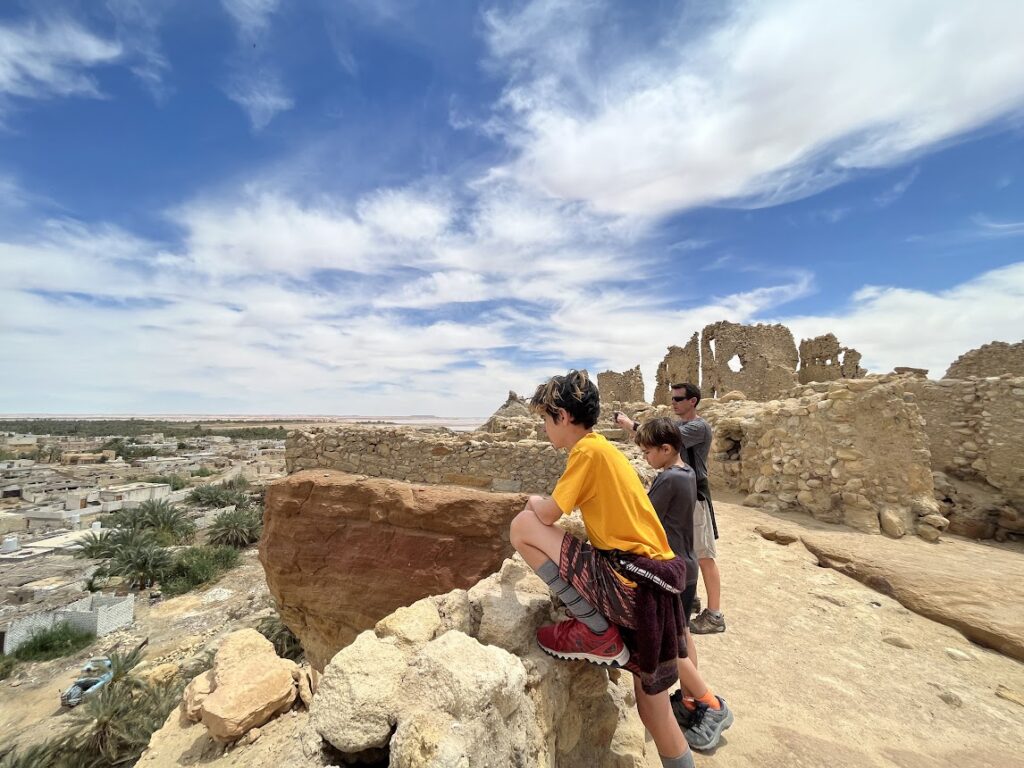
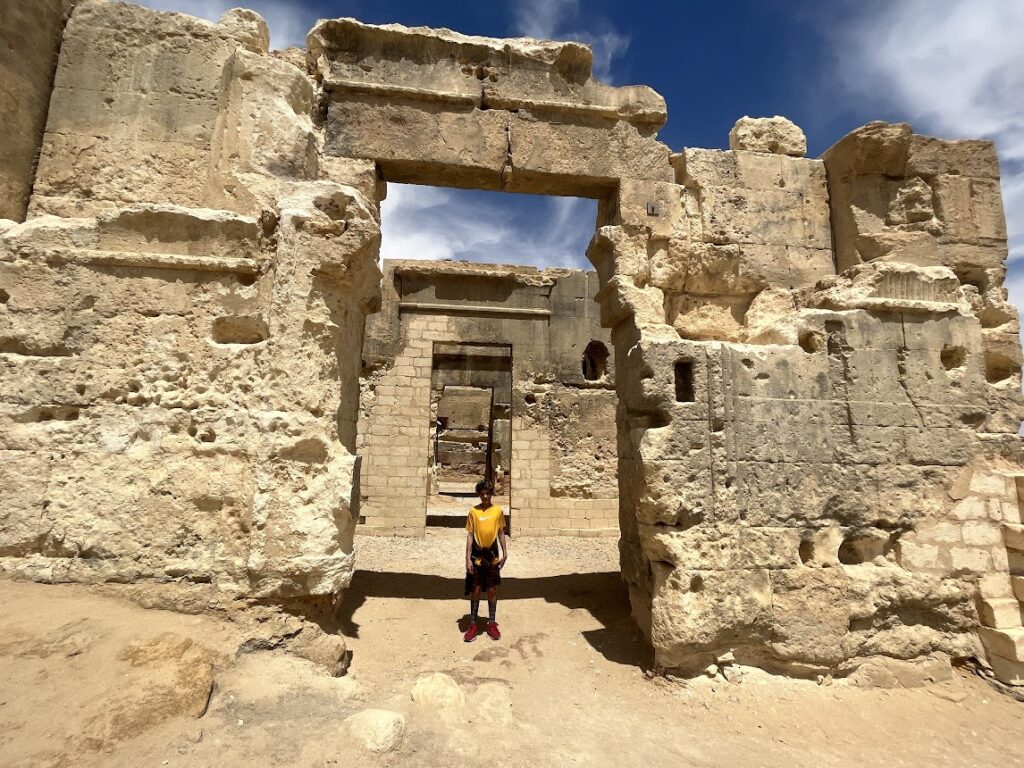

We stopped in at the Desert Rose Hotel for snacks and a swim. The hotel was recently purchased by Camilla’s friend Lynn who is moving to Siwa to open the hotel and host retreats. We went swimming and had some snacks.

After visiting Desert Rose, we headed out west to Siwa Oasis Lake passing Roman tombs carved into mountains and stopping at Alexander the Great Temple. We had snacks, the kids threw
the football, and we explained baseball to Adel before heading home.
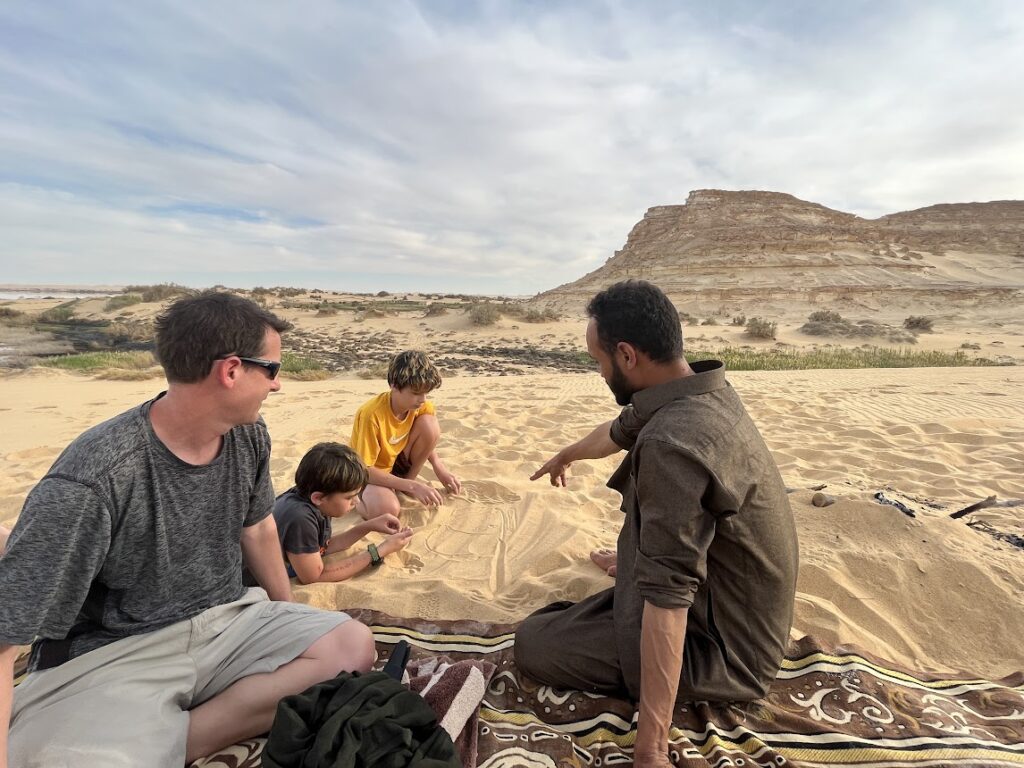
A trip to Siwa is not complete without a trip to the desert. We went with Adel, Luca, and Astra. We stopped for fishing at an oasis before heading to the dunes. We had a wild ride going up and down the dunes in Adel’s car. He even got stuck a few times. The kids enjoyed running up and down the dunes and sandboarding! We stayed until after sunset. The stars are incredible.


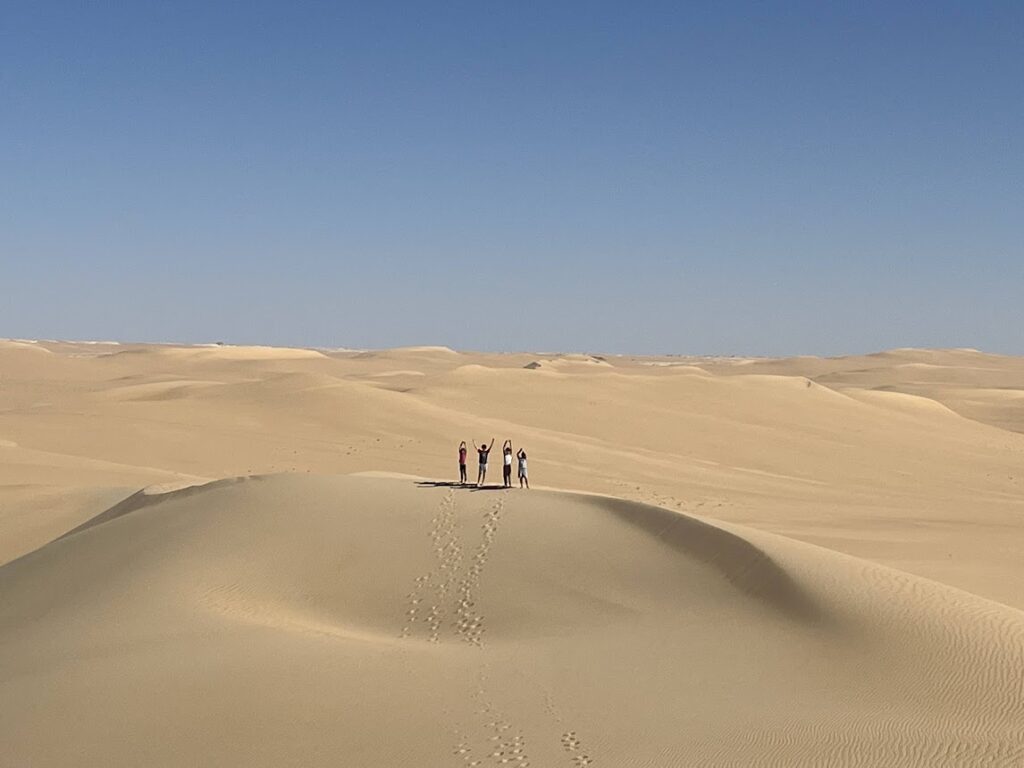

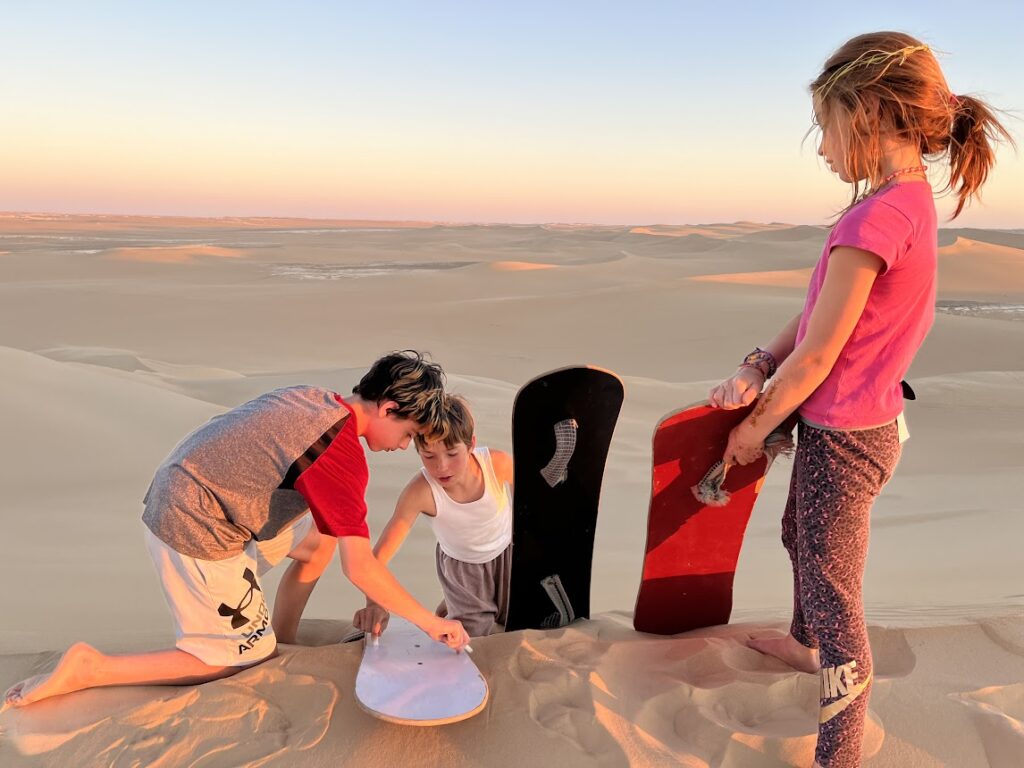
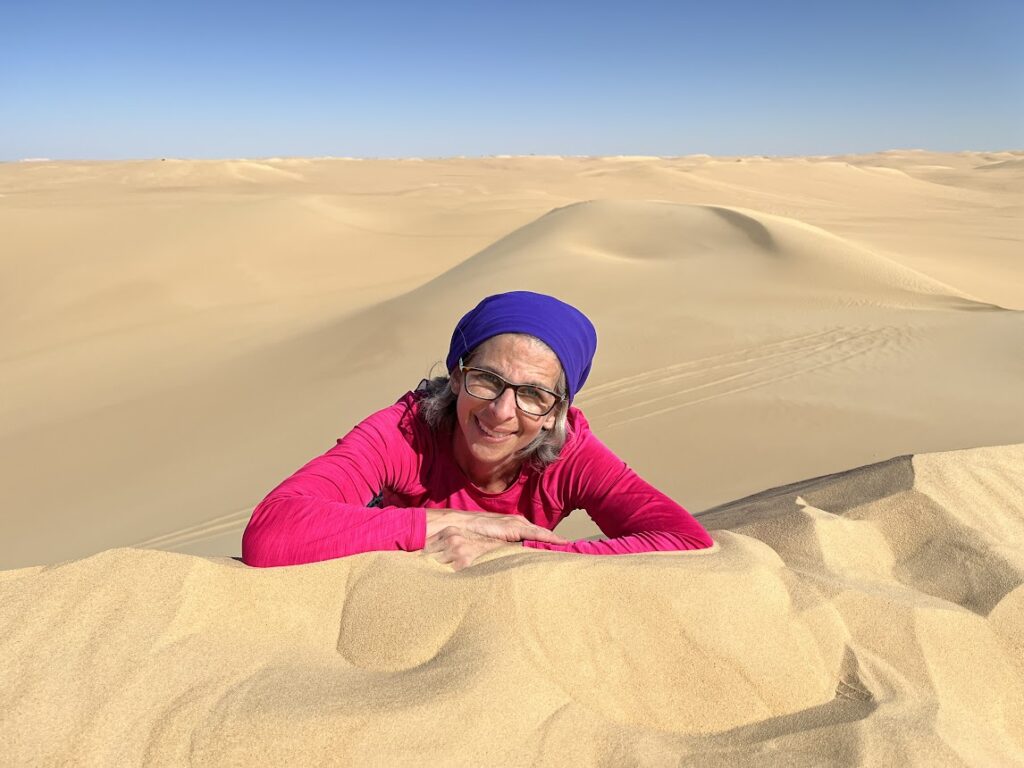

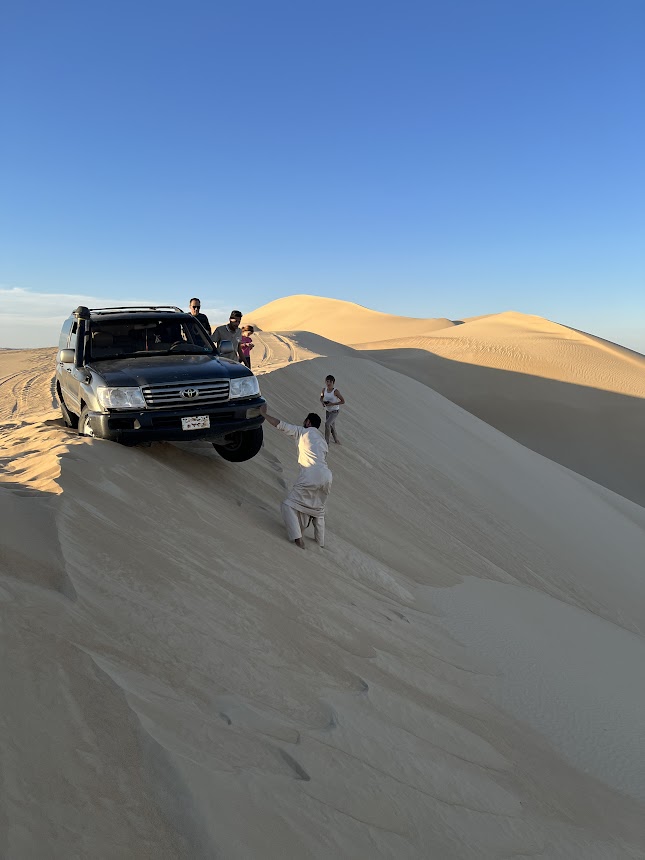
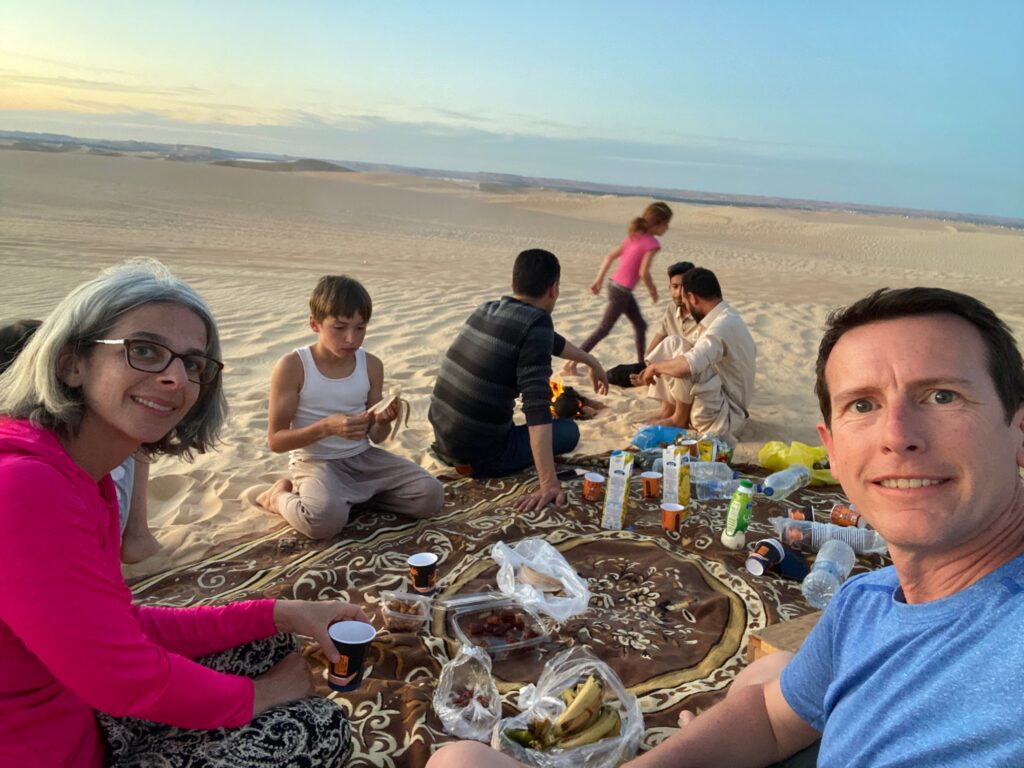
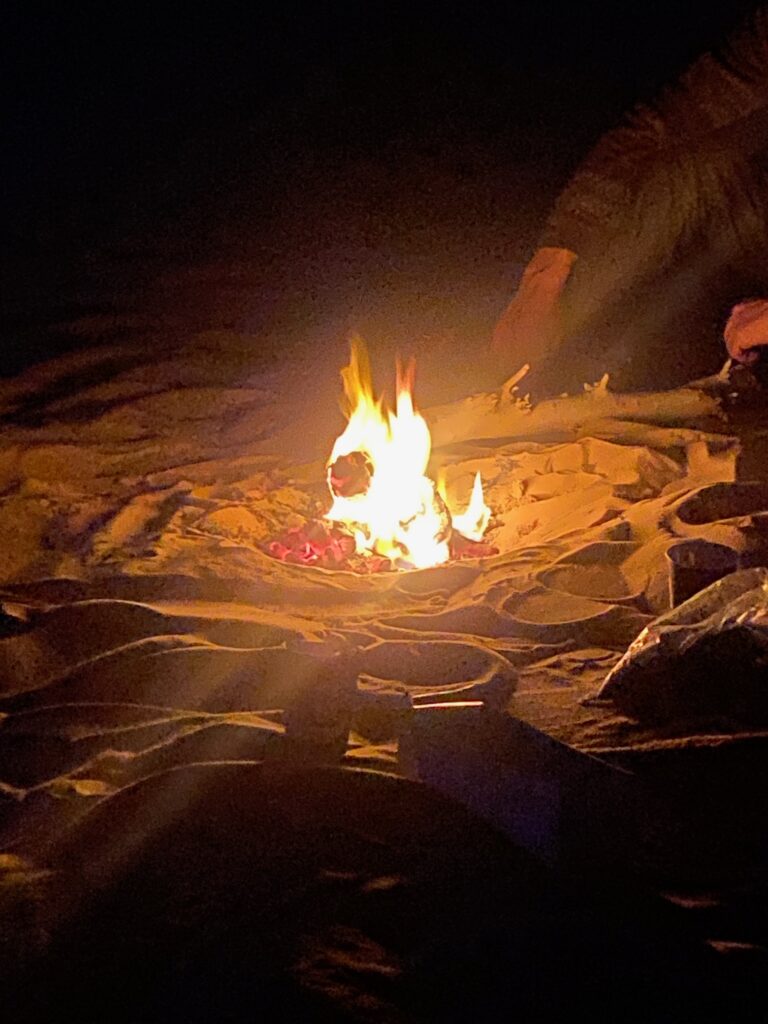
Lucas and Henry spent more time out with Luca, Astra, and Roudaina. They painted a mural on a fish shop in town. They did another cooking class with Roudaina. With the end of Ramadan near, they decided to make cookies. As we walked around Siwa we saw the town coming back alive with bakers baking piles of cookies, shops getting resupplied, and people running errands to prepare for Eid (the end of Ramadan).
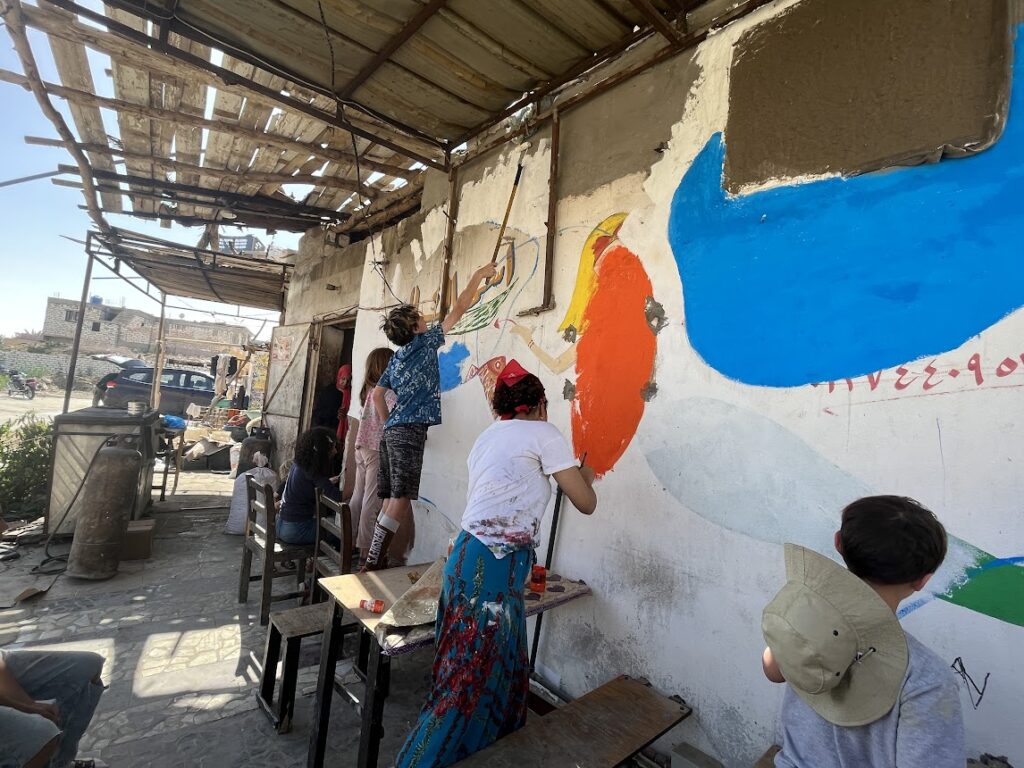

We spent one of our last days at Fatnas Island. The kids swam in the spring there and took a peddle boat out in the lake. Luca brought his fishing net, and they caught a few fish. We drank smoothies and
had a nice conversation with Camilla and Danielle. The kids had so much fun that they went back the next day with Goma, a family friend of Camilla and Daniel.
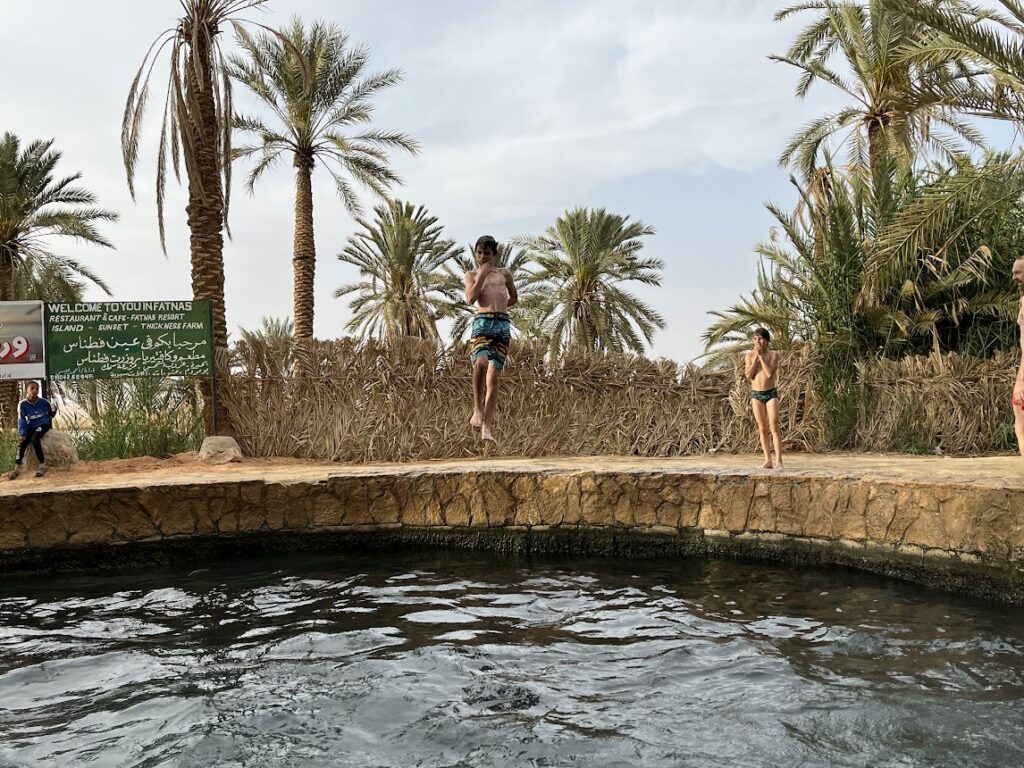
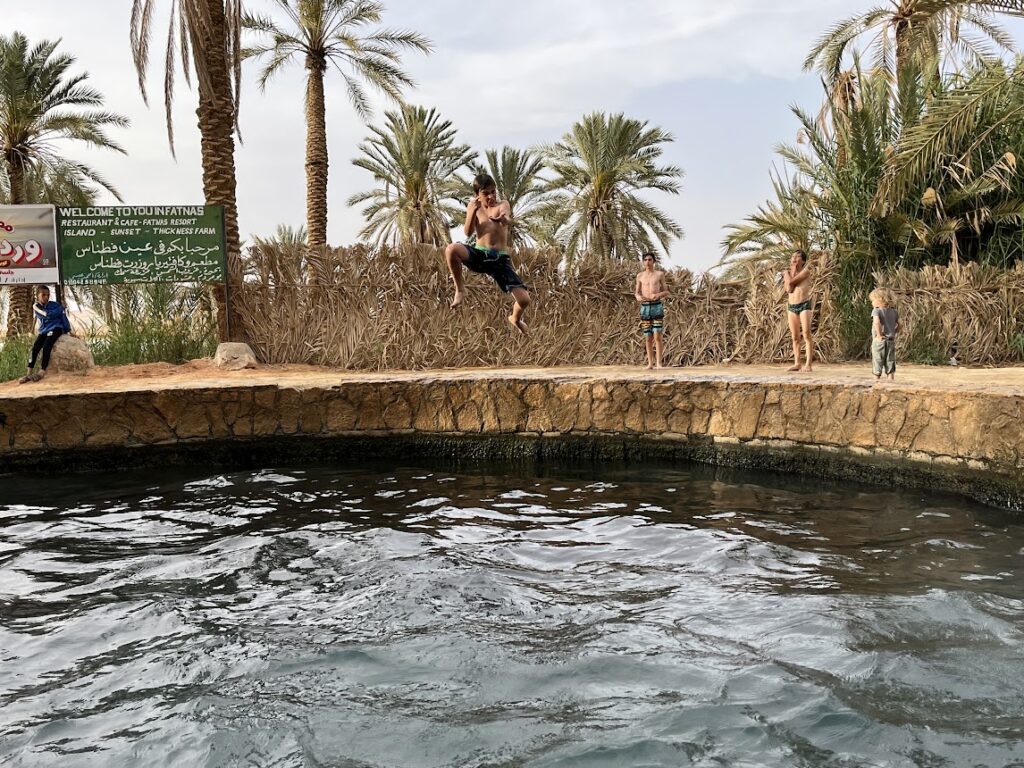
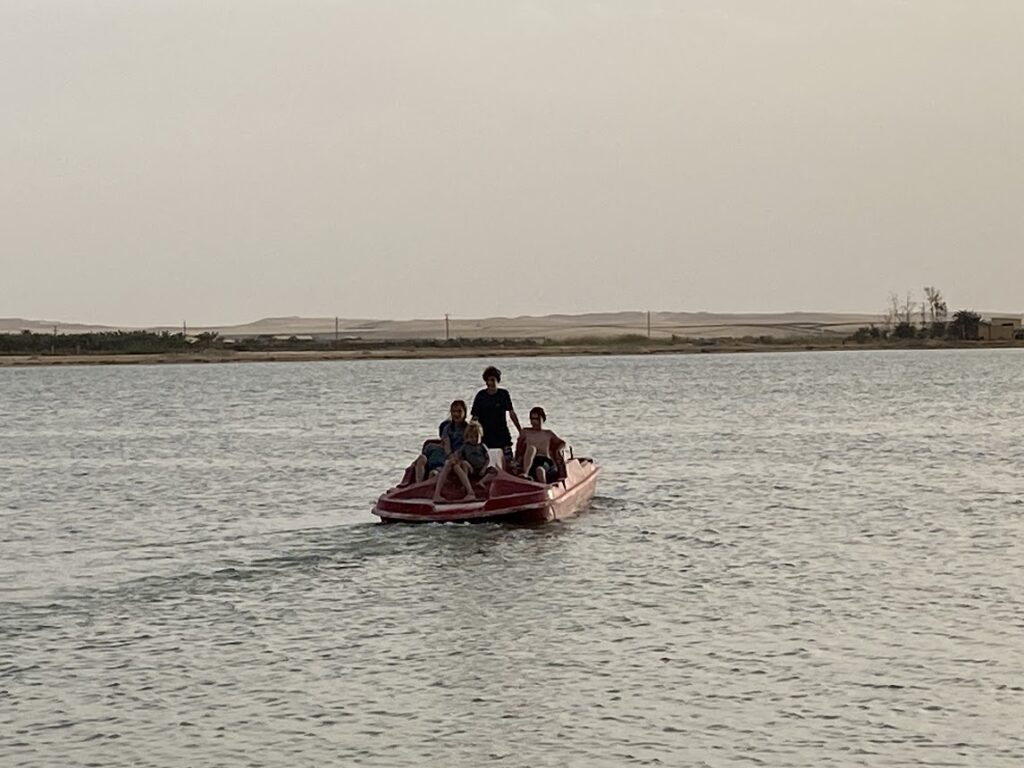
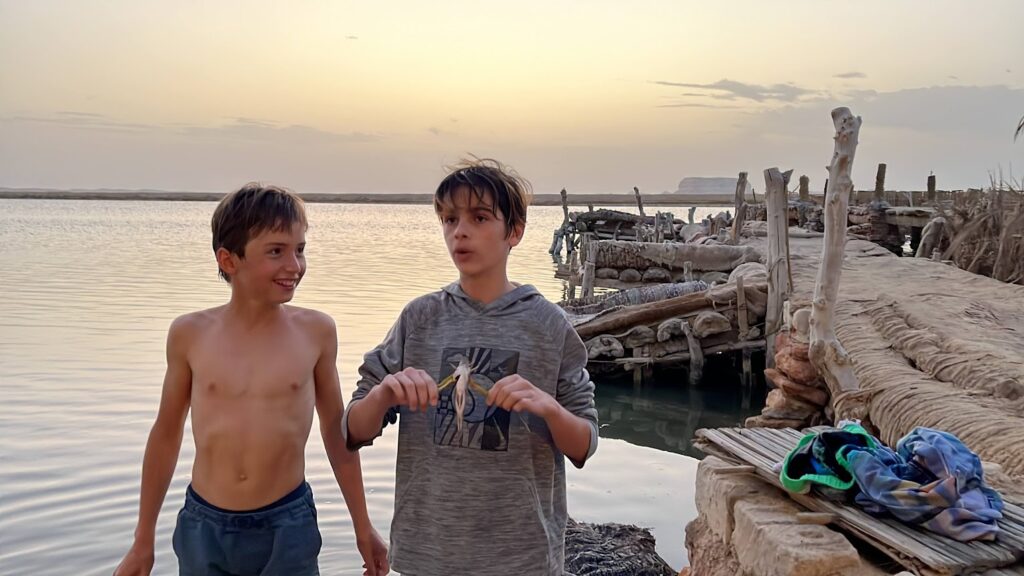
We went to a local Siwa house for dinner on our last night. Coca (a woman who works for Camilla) and her family prepared a delicious meal. They made soup, rice, beans, meat, bread, Spicey eggplant, and spicy pickled lemons. Pickled lemons are one of the most unique foods I have ever eaten. Henry even tried it and liked it.
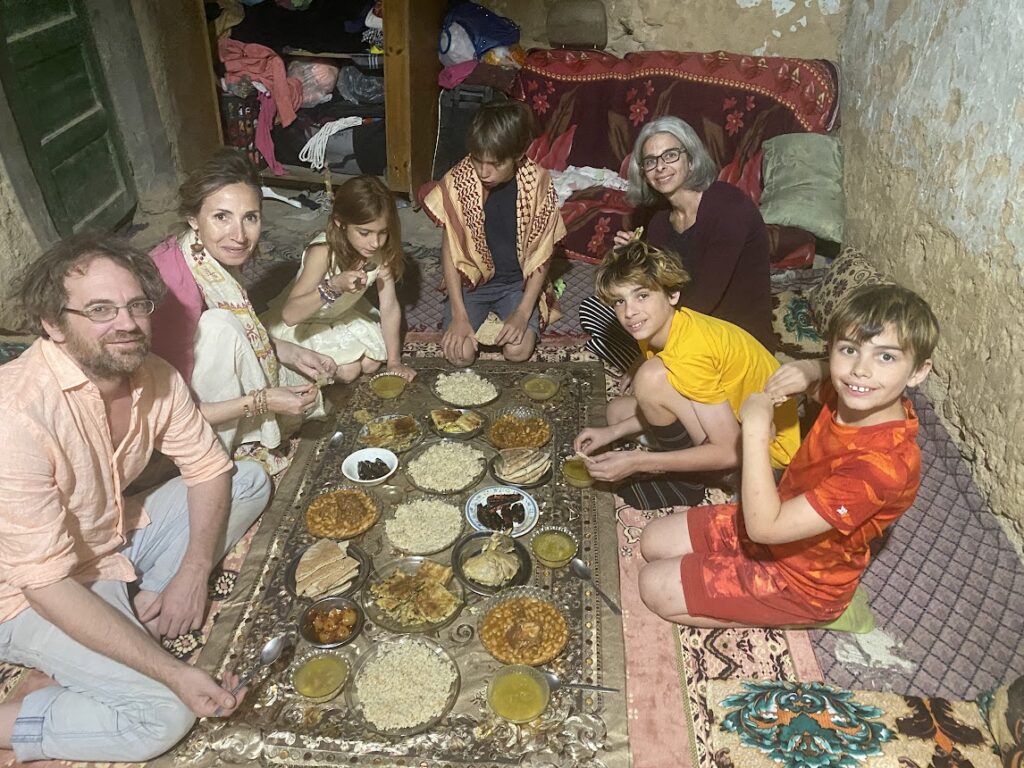
Siwis are generous. Coca and her family do not have a lot by Western standards. They live in small basic houses. They have sheep and goats and live hand to mouth. Yet despite not having a lot, they shared what they did have with us. They smiled and laughed and looked truly happy. It is a powerful lesson to see people living fulfilling lives by valuing the right things (family, health, connection to people and the earth), things that are being forgotten by Western culture. Western culture values money, power, status, and materialism, and it is leading to anxiety, depression, and poor health. Siwis have held on to something truly magical.
Siwa is a chaotic yet peaceful place. There is a lot of activity in the town, but it is not the same grind as in the United States. People stop to talk to one another about their families and other aspects of their lives. A hot topic of conversation is the cost of goats and sheep. There is a genuine connection between the people here that feels warm and not transactional. Many people welcome us and say hello as we walk through the town. The pace of Siwa is refreshing.
Our 10 days in Siwa seemed like a long time because the pace of everything is slower, but at the same time, it was too short. We are grateful to Camilla and Daniel for their hospitality while we were
there. It was a special trip for us.

